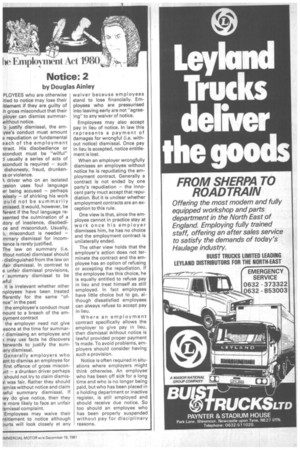lie Employment Act 1980" Notice: 2
Page 25

If you've noticed an error in this article please click here to report it so we can fix it.
by Douglas Ainley
PLOYEES who are otherwise itled to notice may lose their itlement if they are guilty of ;f1 gross misconduct that their ployer can dismiss summarwithout notice.
"o justify dismissal, the emyee's conduct must amount a repudiation or fundamental each of the employment itract. His disobedience or sconduct must be "wilful" usually a series of acts of sconduct is required — such dishonesty, fraud, drunkenss or violence.
driver who on an isolated .-;asion uses foul language er being accused — perhaps wisely — of shirking his work ould not be summarily ;missed. It would, however, be ferent if the foul language reasented the culmination of a ;tory of insolence, disobedice and misconduct. Usually, D, misconduct is needed — mmary dismissal for incomtence is rarely justified.
The law on summary (i.e. thout notice) dismissal should distinguished from the law on ifair dismissal. In contrast to e unfair dismissal provisions, r summary dismissal to be
Afful
it is irrelevant whether other nployees have been treated fferently for the same "ofnce" in the past the employee's conduct must nount to a breach of the emoyment contract the employer need not give asons at the time for summarr dismissing an employee and a may use facts he discovers terwards to justify the sumiary dismissal.
Generally employers who ant to dismiss an employee for first offence of gross misconJct — a drunken driver perhaps should not try to claim dismiswas fair. Rather they should ismiss without notice and claim wful summary dismissal. If ley do give notice, then they re more likely to face an unfair ismissal complaint.
Employees may waive their ntitlement to notice although purls will look closely at any waiver because employees stand to lose financially. Employees who are pressurised into leaving early are not "agreeing" to any waiver of notice.
Employees may also accept pay in lieu of notice. In law this represents a payment of damages for wrongful (i.e. without notice) dismissal. Once pay in lieu is accepted, notice entitlement is lost.
When an employer wrongfully dismisses an employee without notice he is repudiating the employment contract. Generally a contract is not ended by one party's repudiation — the innocent party muct accept that repudiation. But it is unclear whether employment contracts are an exception to this rule.
One view is that, since the employee cannot in practice stay at work once his employer dismisses him, he has no choice and the employment contract is unilaterally ended.
The other view holds that the employer's action does not terminate the contract and the employee has an option of refusing or accepting the repudiation. If the employee has this choice, he is equally entitled to refuse pay in lieu and treat himself as still employed. In fact employees have little choice but to go, although dissatisfied employees can always refuse to accept pay in lieu.
Where an employment contract specifically allows the employer to give pay in lieu, then dismissal without notice is lawful provided proper payment Is made. To avoid problems, employers should consider having such a provision.
Notice is often required in situations where employers might think otherwise. An employee who has been off sick for a long time and who is no longer being paid, but who has been placed in a holding department or inactive register, is still employed and should receive due notice. So too should an employee who has been properly suspended without pay for disciplinary reasons.






































